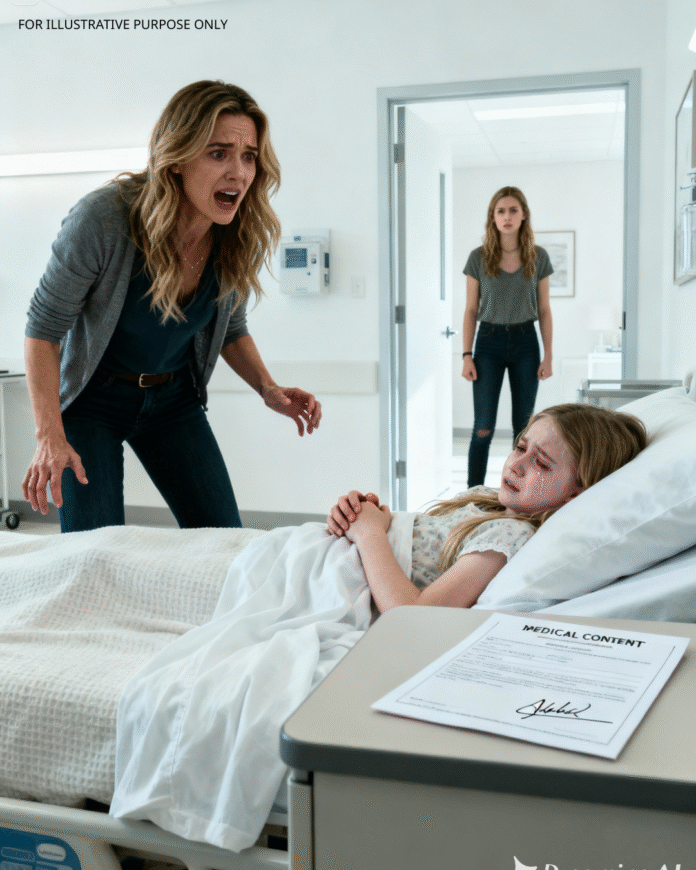Last Updated on November 25, 2025 by Grayson Elwood
Caroline Hayes was settling into a routine morning when her cell phone rang. The caller ID showed Lincoln Ridge Elementary — the school her eight-year-old daughter, Grace, attended. The moment she heard, “Grace became unwell and needs to be seen right away,” everything else faded. Her only thought was to get to her child as quickly as possible.
She left her office with shaking hands, barely aware of the road beneath her tires. Grace had always been bright, energetic, the kind of child who ran through life with enthusiasm. Nothing prepared Caroline for the worry that filled her chest as she pulled into Northbrook Children’s Hospital.
She rushed through the sliding doors, breath caught somewhere between fear and determination. The receptionist glanced up and said, as casually as if reporting the weather:
“Your family just left your daughter’s room.”
Caroline stopped short.
Her family?
Already here?
And none of them had called her?
Before she could reply, she heard familiar laughter down the hall. Her parents and her younger sister, Riley, strolled toward her with the ease of people returning from a leisurely outing, not a hospital visit.
She didn’t speak. She didn’t need to. She simply stepped around them and hurried to her daughter.
The Moment She Saw What They’d Done
Grace lay curled under the white blanket, her small face pale, breathing quick and shallow. Her frightened eyes brightened the moment she saw her mother.
But the real shock sat on the tray beside the bed.
A stack of medical forms.
A consent document.
Her sister’s signature — not hers — written across the bottom.
Caroline stood completely still. Inside, something tightened into a knot she couldn’t yet name.
“Mom…” Grace whispered. “They told me you were too busy to come.”
The sentence stung more than anything else in the room.
Just then, Dr. Collins stepped in. “Ms. Hayes, I’m glad you’re here. We’ve been waiting for your approval before taking the next steps.”
Caroline gestured toward the form. “Why was I not contacted? I’m the one responsible for these decisions.”
The doctor’s expression was apologetic but firm. “We were told you couldn’t be reached, and your family indicated they were authorized to answer on your behalf.”
Caroline’s reply was quiet, but steady. “That wasn’t correct.”
Right on cue, her family appeared again in the doorway. Riley folded her arms. “Someone had to step in. You weren’t here.”
Caroline felt her composure sharpen. “You didn’t notify me. You didn’t even wait to hear from me.”
Her mother gave a dismissive sigh. “We handled everything. You should be grateful.”
Caroline looked at Grace — who looked anything but reassured.
And in that instant, she understood that this wasn’t just about a hectic day or a miscommunication. This was about years of patterns she had been too tired, too hopeful, or too forgiving to confront.
Drawing a Boundary She Had Avoided for Too Long
Dr. Collins later explained that Grace had experienced a sharp drop in blood sugar combined with stress — nothing life-threatening, but enough to scare her and require observation. With proper rest and a calm environment, she would recover well.
A calm environment.
Something Caroline’s family rarely offered.
When she re-entered the room, Riley stood waiting, impatience flickering across her expression.
“Don’t act like we’re outsiders,” she said. “We’re your family.”
Caroline kept her tone even. “Family supports. Family communicates. Family does not take over decisions about a child who is not theirs.”
Her father shook his head. “You’re making it bigger than it is.”
But she had reached her limit.
“Please leave,” she said quietly.
Riley stepped forward. “You can’t push us out. We care about her.”
Caroline didn’t raise her voice. “You may visit when I say it’s appropriate. But not today. Not after what happened.”
For the first time, they didn’t argue. Whether it was the tone of her voice or the look in her eyes, they simply walked out.
Grace shifted closer, small fingers wrapping around her mother’s sleeve. “Do I have to talk to them later?” she asked.
“No, sweetheart,” Caroline said softly. “Only if you choose to.”
The relief on Grace’s face was both comforting and heartbreaking.
A Mother Who Stopped Second-Guessing Herself
While Grace rested, Caroline opened her phone — not to reach out to her family, but to take a more important step. She requested a consultation with a family attorney. Not out of anger, but out of clarity.
For years, she had brushed off controlling comments, ignored oversteps, and endured decisions made for her instead of with her. But today crossed a line she couldn’t continue to overlook. This time, she wouldn’t excuse it.
Dr. Collins returned with a care plan and reassured her once again. “With rest and stability, she’ll bounce back quickly.”
Caroline smoothed Grace’s hair and nodded. “She’s stronger than she seems.”
The doctor smiled gently. “With support, children thrive.”
When Grace was discharged, Caroline carried her daughter’s bag with one hand and held her close with the other. As they stepped into the lobby, her family stood waiting.
“You’re still upset about this?” Riley asked, incredulous.
Caroline didn’t slow her steps. “I’m choosing what’s best for my daughter. And that means setting boundaries you should have respected long ago.”
“You’ll come back,” Riley said quietly.
Caroline turned, calm and certain. “No. Not this time.”
She walked out with Grace into the cool evening air, feeling something she hadn’t expected:
Relief.
Strength.
A sense of returning to herself.
It wasn’t her daughter’s sudden illness that changed everything that day.
It was the moment Caroline stopped apologizing for protecting her child — and chose a healthier path forward for both of them.



